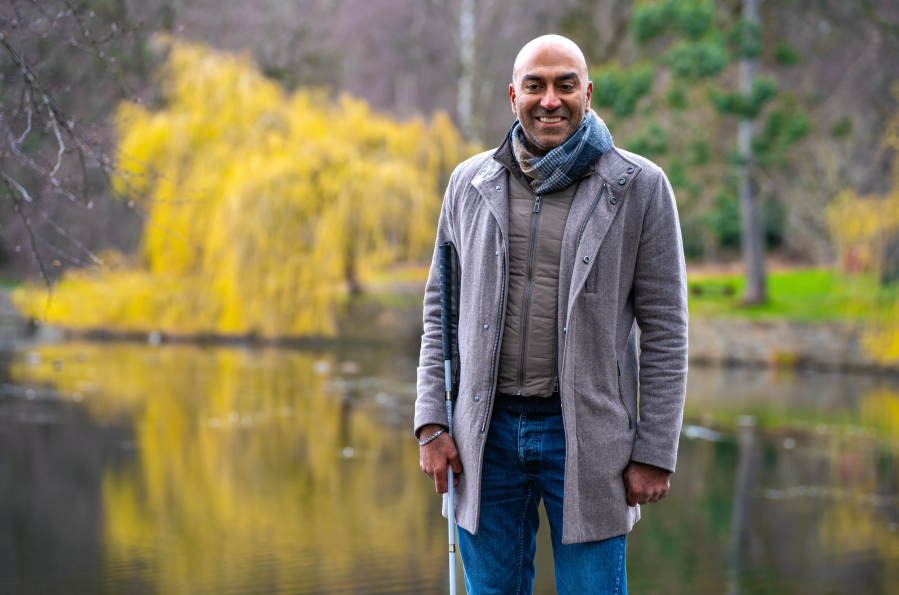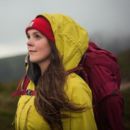We interview Amar Latif about his new role as president of the Ramblers and how he hasn’t let blindness prevent him living a life of travel and adventure.
Due to an incurable eye condition diagnosed aged four, Amar Latif had lost 95% of his sight by the time he turned 18. He was repeatedly told he wouldn’t be able to see the world.
Since then, Amar has hiked widely across the world and featured in travel documentaries, which among other things have seen him walk across Nicaragua (2005’s ‘Beyond Boundaries’) and explore remote regions of Turkey (2019’s ‘Travelling Blind’).
Having recently been announced as the new president of walking charity The Ramblers, Amar talks to us about what he wants to achieve in his new role, how the ways in which he experiences nature have been shaped by being blind, and his desire to make the outdoors more accessible to everyone.
The Great Outdoors: Congratulations on your new role! What do you hope to achieve as the new president of The Ramblers?
Amar Latif: I was delighted and honoured to be asked to become the president of the Ramblers. I love walking and I love enabling other people to go walking. It’s early days but my main objective is to inspire everyone to get out there and enjoy the great outdoors. Some people might not choose to go walking as they may think it’s not for them or feel uncomfortable being out there. My mum and dad were originally from Pakistan and they didn’t see going out walking as ‘a thing’. They were more focused on putting food on the table for their family.
Others might feel like the word ‘rambler’ has a certain image. I hope I can help to remove those preconceptions and help all kinds of people with different abilities to think ‘if the president of the Ramblers is a blind guy and he goes walking I can go out there and appreciate the outdoors’. I’d like to see the outdoors become more inclusive. We live on a beautiful island and a beautiful world and it’s all of our rights to be able to go out and explore it.
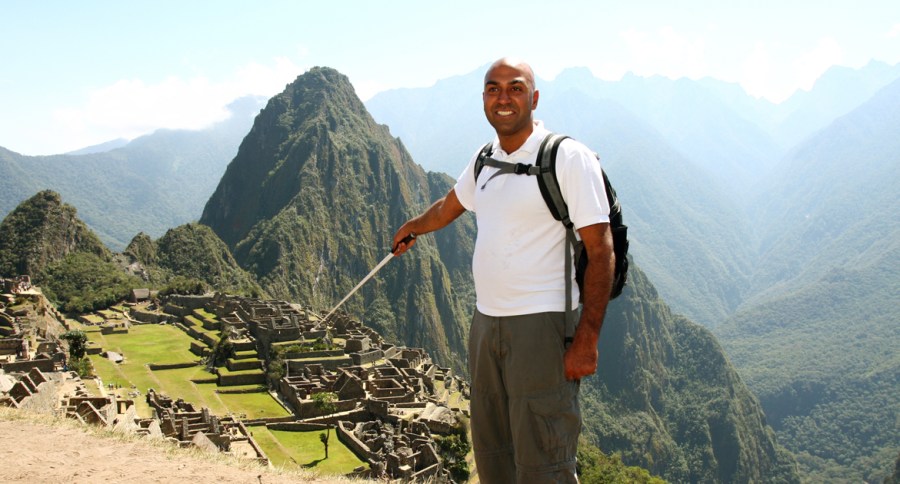
Amar up Mount Machu Picchu.
Credit: Amar Latif
The Great Outdoors: Growing up in Glasgow, can you tell us about where your passion for travel began, and about those initial connections with the great outdoors?
Amar Latif: As a young kid growing up in Glasgow I was losing a bit of my sight but I loved being outside and riding my bike – something the younger generation has had less of because computer technology is so fantastic these days! But I remember I would be so excited to get out there on a Sunday morning and see how far I could get. My real love for the wilderness and walking started with my 220-mile trek across Nicaragua, crossing from coast to coast across a 5,000ft volcano for the BBC programme Beyond Boundaries.
The Great Outdoors: You were diagnosed aged just four with an incurable eye condition and were repeatedly told you wouldn’t be able to see the world. When did you stop believing the narrative put forward by people who doubted you?
Amar Latif: My passion for travel was ignited when I was in my third year at university. I’d become blind a year before. I decided I didn’t want to spend my life wrapped up in cotton wool so I headed out to Canada – just me and my newly acquired blindness on an adventure. All of that beauty and wildness doesn’t just stay there, it follows you back in your mind. It lives inside you and it builds that confidence in yourself and makes you feel amazing for weeks on end afterwards!
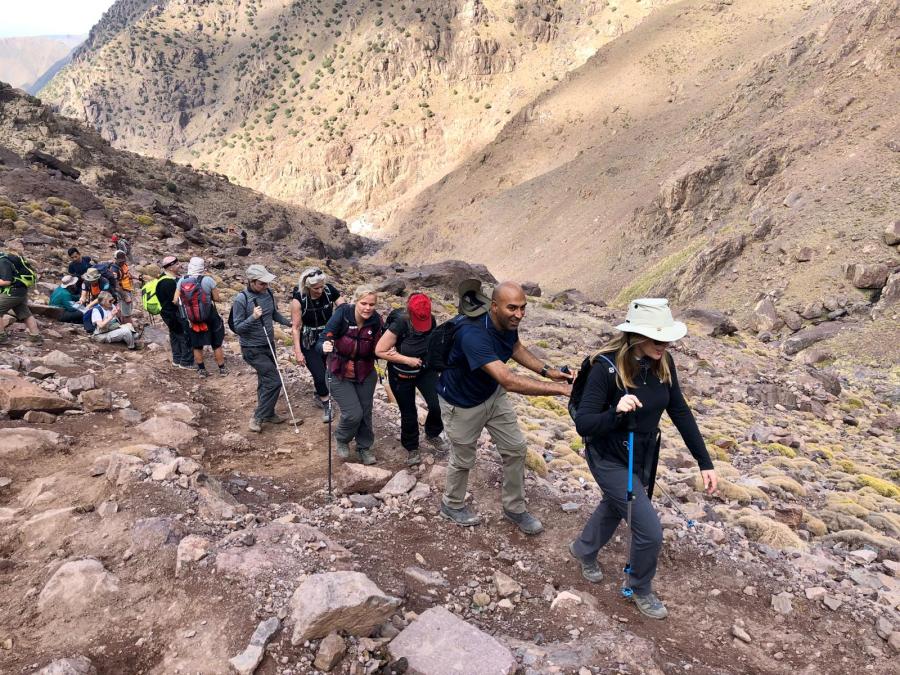
Amar leading the way on a group hike of Toubkal in Morocco.
Credit: Amar Latif
The Great Outdoors: Can you explain the inspiration and ethos behind your travel company?
Amar Latif: After I graduated I was an accountant for British Telecom for seven years and, after corporate life, I had a bit of money to spend and I wanted to go and see the world. I was a single, independent man but when I contacted travel companies I faced rejections when they told me I wasn’t able to go on the trip for solo travels and I’d have to bring someone with me as I’m blind. I also wasn’t able to book onto any walking trips. But I didn’t need a carer. I was an independent young man.
This left me feeling very powerless and I actually felt blind again. Yet, I had this strong urge to build on what I’d already achieved and, if I wanted to travel, I had to change the way travel worked. So, in 2004, I set up Traveleyes, my own international travel operator that takes blind and fully-sighted people on holiday.
About a decade ago we also set up our International Schools Programme where we partner up fully-sighted kids aged 14 to 18 with their ‘VIPs’ – those who are visually impaired – and we go off and explore. The VIPs help build confidence in these young, intelligent adults and in return the young students describe what they’re seeing with such youthful curiosity and share details that bring the setting to life for our VIPs. Barriers between nationalities come down, barriers between generations come down, barriers between the able-bodied and disabled people come down. It’s really beautiful to see the effect it has on everyone.
I love walking and I wanted to get lots more blind people out there because it’s so fabulous. Being blind or having a disability means it can be a bit more difficult to go out but it’s such a special moment for us.
The Great Outdoors: So, tell us a little bit about the ways in which you experience the outdoors?
Amar Latif: I love the sunshine! I might not be able to see – I can see light and dark – but when I feel that sun on my body something happens and I feel so good. When I’m going out there I’m not distracted by sight so my other four senses are fully-operational. In the woods or countryside, I’ll be listening out for birds, little animals, and the wind whistling through the trees. I’ll be feeling the ground below me and the smells of wildflowers and cattle and sheep. I get such beautiful input.
They help me to build an image in my mind and as I walk alongside my sight guide and they describe what they’re seeing, their words paint this canvas. I use all my other senses to bring it to life. If you’re blind, it’s like reading a book whereas if you’re sighted it’s like watching the film – and I think we can all agree the book’s often better as you can build it in your head! I strongly recommend being blindfolded and walking through the countryside.
When you’re walking with someone as a blind person, too, you might be linking arms or lightly following via touch. This touch is just so disarming and you find people quickly open up and feel comfortable to talk about everything, peppered with descriptions. It’s a wonderful experience. You properly engage with what’s there. My friends say, “Come and feel this tree root! They’re really weird!” We’d stop and really be there in the moment. When I was younger, I used to think that a good walk was about getting to the top. But now, it’s more about enjoying the journey.
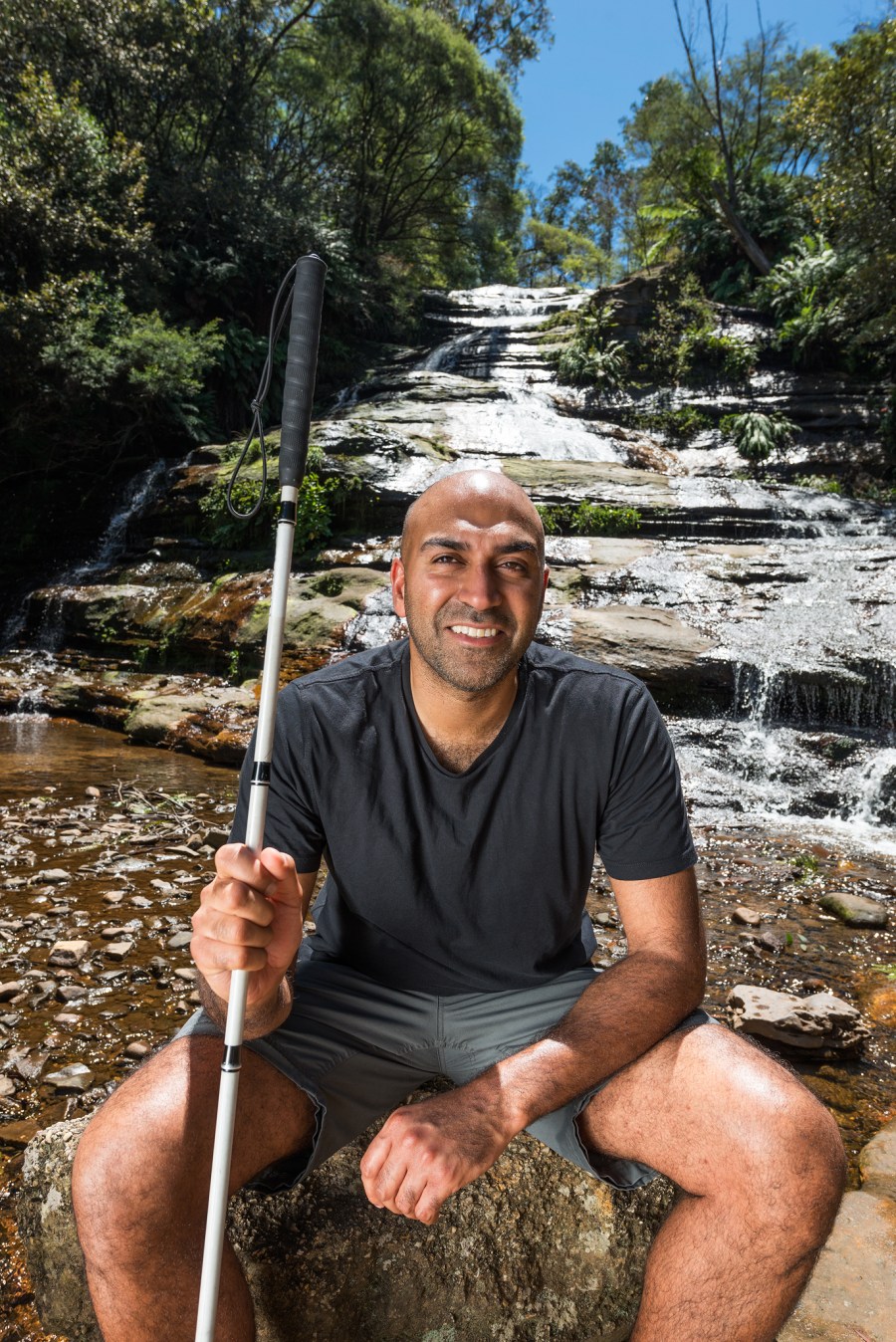
Amar in the Blue Mountains.
Credit: Amar Latif
The Great Outdoors: I’ve seen you’ve been bungee jumping, trekking, kayaking, and have scaled volcanoes. Any personal highlights?
Amar Latif: Yeah, I bungee jumped off one of the first-ever bridges in New Zealand – I don’t think the guy had had a blind person do it before and I couldn’t see – but it was an amazing experience! Walking in Turkey was so peaceful and still and sunny. The hills around the white villages of Andalusia in Spain are so beautiful, as are the Bulgarian mountains. I’ve been on a pilgrimage with six celebrities but also enjoyed the beautiful Yorkshire countryside.
But I’ve loved walking and chatting to all kinds of people in the likes of South Africa in the townships where we heard laughter constantly and Niagara where I could feel the mighty falls on my face. We’ve cooked in traditional Tuscan farmhouses where the smells of fresh basil are overwhelming. I’ve walked Machu Pichu in Peru and travelled to Lake Titicaca where we met indigenous people who had never met a blind person before. Upon my return a few weeks later with another group, they had actually made a little model of the island so we could feel and touch where things were.
The Great Outdoors: What life lessons learned on your adventures are you hoping to bring to your role as President of The Ramblers Association?
Amar Latif: I found in life that if you dare to push your limits your world becomes bigger. I have doubted my abilities before – especially on Celebrity Masterchef because I’m blind and I can’t cook! – but with encouragement, you just find a way of doing things. Even if you’ve never been walking before or feel uncomfortable or are a bit shy, it’s so rewarding to get out there. Just take it one step at a time.
The Great Outdoors: What can we all, as hillwalkers, do to support more people in accessing the outdoors?
Amar Latif: The Ramblers continue to do such a phenomenal job opening the countryside for all of us. I hope my appointment inspires that to open up further for all kinds of people.
The main thing I would just advise people is don’t have any preconceptions about what people can and can’t do. And don’t feel like you’re walking on eggshells. Don’t worry about saying the wrong thing because you’ll miss out on that dialogue. You might end up seeing things in ways that you hadn’t seen before!
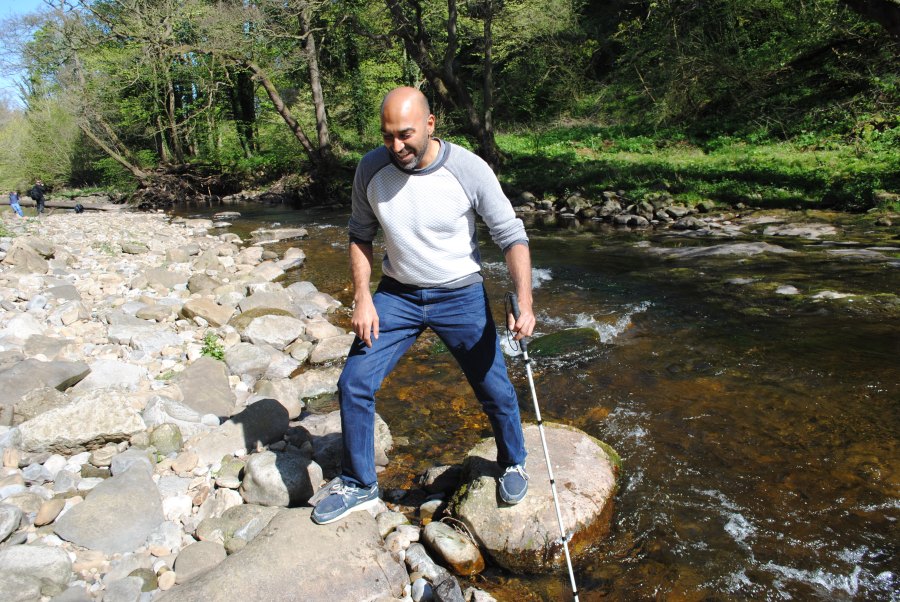
Amar on the bank of the river Ure at Middleham in Wensleydale.
Credit: Amar Latif
The Ramblers is currently campaigning to expand the freedom to roam to give more people access to open landscapes.

